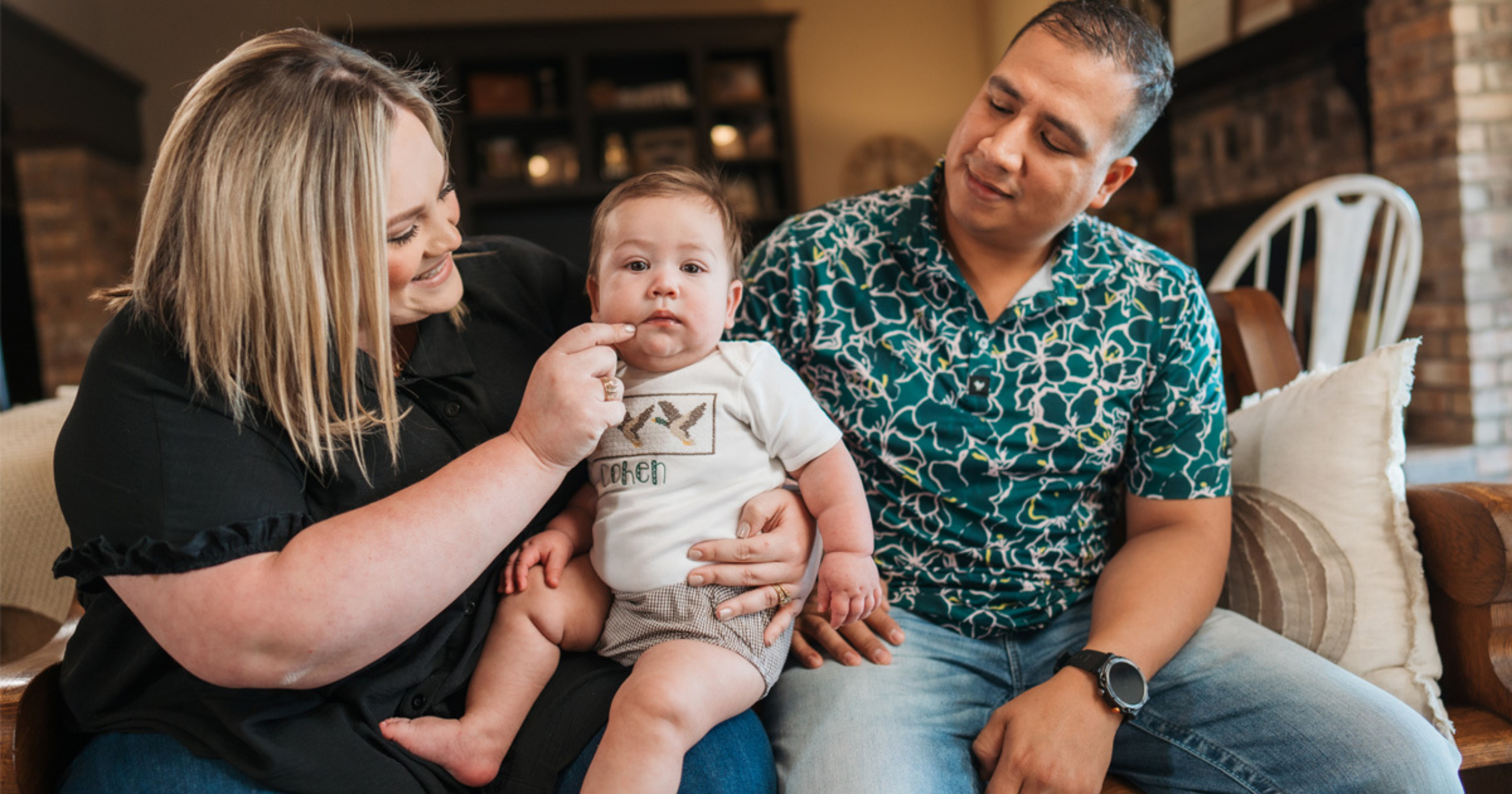A Tiny Fighter With a Strong Heart
The Texas Center for Pediatric and Congenital Heart Disease gives family new hope through life-changing care
Reviewed by: Kandace Villareal
Written by: Lily Vining
The first thing Kandace Villareal remembers about her son, Cohen, is his strength. “From day one, he kept us on our toes,” recalls Kandance. “He’s always been a fighter.”
But nothing could have prepared Kandace and her husband, Carlos, for just how much their firstborn would have to fight in his first 11 months of life. Born with a complex heart condition, Cohen’s journey took them across hospitals and through moments of uncertainty, testing their faith and resilience before leading them to UT Health Austin congenital heart surgeon Charles D. Fraser, Jr., MD, who serves as the Chief of Pediatric and Congenital Heart Surgery for the Texas Center for Pediatric and Congenital Heart Disease, a clinical partnership between Dell Children’s Medical Center and UT Health Austin.

An Unexpected Twist
Cohen’s family didn’t learn about his severe heart condition until after he was born. Following an emergency C-section, he was placed in the NICU due to low oxygen levels. During routine procedures, an X-ray for a feeding tube revealed something alarming—Cohen’s heart was positioned “backward.” This led to the diagnosis of heterotaxy and asplenia, a condition in which internal organs are abnormally arranged, and the spleen is missing. Although his oxygen levels remained stable, doctors initially postponed surgery, hoping to give his body time to grow stronger.
At four months old, Cohen’s health took a turn. He was hospitalized for observation due to lack of weight gain, during which he experienced distress, pneumonia, and a nine-week stay in the ICU. His condition grew more critical as other doctors declined to proceed with the Glenn procedure, a type of open-heart surgery performed on infants that redirects blood flow from the upper body directly to the lungs, reducing the heart’s workload and improving oxygen levels. For the procedure to be successful, the heart and lungs must be strong enough to handle the changes in circulation.
Cohen’s doctors feared his heart would not withstand the procedure. As a result, discussions shifted toward compassionate care, a medical approach focused on comfort and quality of life when aggressive treatments may not be beneficial, or the possibility of a heart transplant.
“In my heart, I knew that Cohen’s fight wasn’t over,” shares Kandace. “I knew this was just another bump in the road, and we were not ready to give up.”

A Search for Second Opinions
Determined to find another path, the family sought second opinions from the Texas Center for Pediatric and Congenital Heart Disease. After reviewing Cohen’s case, Dr. Fraser immediately began planning for surgery, even calling the family on his day off to get the process underway.
“From day one, the team at the Texas Center for Pediatric and Congenital Heart Disease treated Cohen like family,” recalls Cohen’s parents. “They knew him by name and never saw him as just a number.”
That level of personal care extended beyond just words. The family felt heard and trusted the providers caring for their child. After a cardiac catheterization procedure, Cohen was held overnight. When he awoke, he was in distress.
“He woke up fighting mad,” shares Kandace. His distress triggered alarms, and providers from across the ICU rushed to his bedside— including Michael Chomat, MD, a UT Health Austin pediatric critical care intensivist in the Texas Center for Pediatric and Congenital Heart Disease. As Cohen became increasingly overwhelmed, Kandace asked the care team to pause. Dr. Chomat immediately supported her, instructing the team to step back and focus on calming Cohen first.
“That was one of the first times in Cohen’s care that I truly felt seen by a doctor,” says Kandace. “He trusted me as Cohen’s mother, and that meant everything.”
A Miraculous Recovery
After months of fear and uncertainty, the family felt an unexpected sense of peace on the day of Cohen’s surgery. Kandace recalls the reassuring words of UT Health Austin pediatric anesthesiologist Erin Gottlieb, MD, who serves as the Chief of Pediatric Cardiac Anesthesiology for the Texas Center for Pediatric and Congenital Heart Disease, who reminded them that Cohen was in the hands of the “A team” and would receive only the best care.
The surgery was a success. When Dr. Fraser met with the family afterward, he provided further reassurance. “‘I truly believe this surgery will last him a long time,’” Kandace recalls Dr. Fraser saying. “Hearing that gave us the hope we had been holding onto for so long.”

Cohen proved just how much of a fighter he was. Defying expectations, he was discharged just six days later.
His story is a testament to resilience—not only his own but that of his family, who never stopped advocating for him. The journey was filled with twists and turns, but with the expertise and compassion of the Texas Center for Pediatric and Congenital Heart Disease by their side, they found their way through.
“The road may not be easy, but these heart babies are strong,” encourages Kandance. “And no matter how hard today is, tomorrow always brings hope.”
To learn more about the Texas Center for Pediatric and Congenital Heart Disease, visit here.